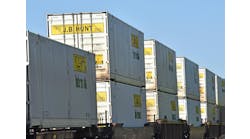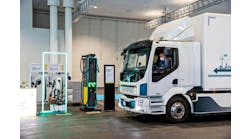Shippers should be willing to change modes when necessary to find capacity
There's little doubt that capacity issues will continue to plague shippers during 2005. Carriers are dealing with driver shortages, Hours of Services matters (particularly for truckload) and are reluctant to replace current rolling stock because of the need to meet future governmental engine requirements, among many other problems.
Shipper experiences of late include having loads to tender that are being refused — although equipment is available, drivers aren't. What's more, in these times with less capacity to offer, trucking companies are looking closely at shipper profiles and turning down those who don't meet core carrier requirements. So what's a shipper to do?
Flexibility is key to trying to corral capacity. That flexibility might manifest itself in a willingness to back away from early delivery times and to look beyond a single mode to alternative modes where there may be space. There are a number of services available to help in finding capacity, although they too are occasionally experiencing the same capacity shortages as the rest of the shipping community, and may be unable to locate a carrier to take on a shipment.
Available services don't just find a carrier willing to transport a load from one point to another — they can look at a shipper's entire network and work in partnership to optimize product movement. For instance, Meridian IQ Inc., a provider of logistics services and transportation management systems (TMS), looks at shipper networks not only to identify what modes are being used today but also the lead times and the company's supply chain objectives.
For international imports, a service provider can help the shipper streamline the information process and use a combination of modes to keep costs down while bringing product to a U.S. ocean port faster, explains Valerie Bonebrake, Meridian IQ's executive vice president and chief operating officer-transportation services. "We could do so by consolidating shipments abroad from multiple countries across Asia, then taking advantage of container load pricing to bring it into the U.S.," she says.
Shippers can similarly see advantages on outbound shipments. "In some cases, we can help companies bypass distribution sites to get their product to the end point faster," Bonebrake says. That might mean using truckload, some lessthantruckload (LTL) and even some rail if the shipment isn't as time sensitive.
Another service provider, freightquote.com, offers comparisons of a variety of modes, with the final choice left up to the shipper. "For example, if the shipment is LTL-weight, we will bring back quotes of numerous versions of LTL, including expedited airfreight, deferred airfreight, regular LTL, expedited LTL and guaranteed day LTL," explains Timothy Barton, freightquote.com's chairman and CEO.
The freightquote.com service requires shippers to enter the characteristics of shipment with results varying by price, but also by transit time and whether that transit time is guaranteed. Shippers see the transit times, whether they are estimated or guaranteed, and how that price/time tradeoff varies.
"We list the carriers and provide the ability to select the carrier," Barton explains. "Then we execute all instructions, documents and so forth with the carrier."
Occasionally when a shipper uses freightquote.com to find truckload capacity, "They run into a situation where no matter what they try, they come up empty," notes Barton. "At that point, we have a truckload brokerage group that specializes in apprizing the customer of the situation and trying to work out options."
For those shippers that use Logility Inc.'s TMS, when they electronically create a shipment, all parameters that are part of the information requested enable the system to make decisions. The TMS takes those delivery dates and size of shipment into consideration and seeks carriers and modes to support the shipment as defined. Either the system makes the decision by choosing alternatives or shippers receive a list of modes, carriers, transit times and costs enabling them to make the choice, explains Bill Pritz, vice president of Logility's transportation group.
Load consolidation can help provide a real return on investment (ROI) when using either in-house or outsourced decision-making tools. "Do you have multiple orders going to the same customer that have compatible dates that allow you to put them together?" asks Pritz. "The next phase is, 'Can you build multi-pickup or multistop trucks?' The third element is, 'Are there potential pools or consolidation that can be done?' Load building basically creates a mode in which to ship, and that typically is truckload — the big ROI area in transportation."
While Meridian IQ seeks to consolidate import loads, it works to do the same with domestic shipping. As Bonebrake explains, "If shippers have a planning horizon that says, 'I know when I'm going to build it, but I have a three-day window before I have to ship it,' we are able to consolidate loads and sometimes get a better price by moving from one mode to another — but always making sure we meet the service needs. It's a cost and service tradeoff. We look to the client to guide us as to their need."
Some larger shippers are fragmented in how they buy, particularly if they have multiple divisions or multiple business units, Bonebrake observes. "They are typically buying transportation independently. If we can look at that network holistically, we can often match inbound and outbound loads, which allows us to focus on carriers that want to have that freight both ways. Shippers get better service and capacity when and where they need it. Typically it's a cost containment strategy as well," she says.
While service and solution providers can assist — through brokerage operations or other means — in moving loads to final customers, flexibility is key for shippers. Be willing to work with a broader time horizon and to use alternative modes where they fill your needs.
When appropriate, take advantage of the wider range of services these service providers offer, making load movement one part of a larger shipping program.
As Bonebrake points out, "A key theme for a shipper should be to have good information, understand what your goals are and take a holistic look at your network."
resourcesFreightquote.com www.freightquote.com Logility Inc. www.logility.com Meridian IQ Inc. www.meridianiq.com |


